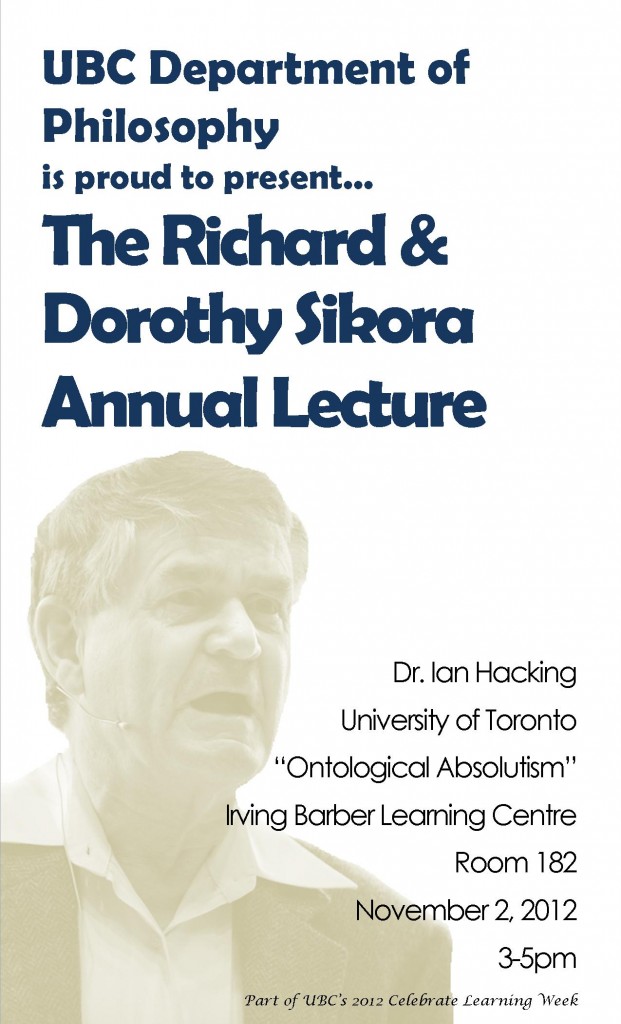Name: Richard & Dorothy Sikora Lecture
Date: Friday, November 2
Time: 3:00pm – 5:00pm
Location: Irving Barber Learning Centre, Victoria Learning Theatre 182
Description: An abstract provided by Dr. Hacking about his lecture:
ONTOLOGICAL ABSOLUTISM
The tradition of natural kinds began in 1840. It is an insular tradition, peculiar to the English language, and identified by the usage of the word ‘kind’ as a freestanding noun for purposes of philosophical logic. There are a few honorary members of the tradition, such as Cournot, writing in 1850 French, and addressing issues similar to those that moved Whewell, in 1840, to designate ‘kind’ for the task of evading debates about natural and artificial groups. In 1843 Mill co-opted Whewell’s language of kinds for two purposes. First, to restore a certain sense to the scholastic (pre-biological, and relative) concepts of genus and species, and, secondly, to solve a problem in his theory of induction and causality posed (he thought) by co-existent (as opposed to causally sequential) properties, such as the blackness of crows. The actual expression ‘natural kind’ was not, it seems, used in print until 1866, by John Venn, who later retroactively renamed Mill’s ‘real Kinds’ natural kinds.
Here is a precise and nicely verbal definition of the tradition of natural kinds: philosophy that uses the English noun ‘kind’ in a certain way, in order to address a family of issues connected with classification, induction, and causation. The tradition, as defined, includes Whewell and Mill and Peirce and James, none of whom used the expression ‘natural kind’, but who wrote in interestingly different ways about kinds. It also includes Quine, who used the title ‘Natural Kinds’, but who, after the first few lines, wrote of kinds. It usefully include Nelson Goodman, who outright rejected the adjective ‘natural, but wrote of ‘relevant kinds’.
The definition blurs only slightly at the edges, for example, with the inclusion of Cournot, who can hardly be expected to have used an English word, but addressed specific philosophical issues of classification and causation more deeply than did his English contemporaries. Even in the 21st century very few philosophers writing in languages other than English discuss natural kinds, and when they do so, they embed themselves in English-language literature. I am unrepentant in singling out this insular tradition. It is just there, like the British monarchy. It may be regretted, but it is a fact. The tradition of natural kinds is a tiny and local part of the philosophical discourse about classification that goes back, in so-called Western philosophy, well before Plato, and which can be recognized in other philosophical traditions. Aristotle is the permanent Grand Master of philosophical discourse about classification. For brevity I shall speak of the tradition, meaning the tradition of natural kinds, and the discourse, meaning philosophical discourse about classification. For many decades the tradition was not only insular but also insulated from some of the vexing issues that perturb the discourse.
The American pragmatists spoke well of kinds, but did not follow the English practice of speaking of natural kinds. Even Quine, author of a paper with the title ‘Natural Kinds’, spoke, after the first few lines, of kinds rather than natural kinds. Nelson Goodman thought there are only relevant kinds, and that the very idea of a natural kind was misleading. Quine, perhaps by inadvertence, licensed the American enthusiasm for natural kinds, which exploded, soon after he wrote, in the definitive contributions of Kripke and Putnam. Those two men generated a veritable industry of natural kinds.
Ticketing Information: FREE
Recommended for General Public and Philosophy Students
Learn more: http://www.philosophy.ubc.ca/
